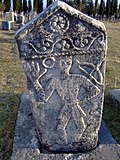Pavlovac (fortress)
Old and New structure
The family hailed and ruled from Pavlovac. It is the second of two castles in their possession, which the family used as a seat. Two castles were built in the space of several decades and within a few kilometers from each other, second being Borač castle or Old Town, and sometimes Old Borač.
Pavlovac
The new castle or New Town, or sometimes New Borač, is actually called Pavlovac, and is considered to be a new structure, also known simply as Novi (English: New) or Novi Grad (English: New Town). Problem exist in correct dating of its construction, but some medieval charters suggest 1392, or late 14th century, as time of its construction, during Radislav Pavlović at the family's helm.
Old Borač
However, historians are certain that another Radinović-Pavlović fortress, original and older Borač than usually described Borač castle, existed, which was built around 1244 in 13th century and located just a few kilometers downstream Prača river, near the location of present-day village Borač, between Mesići and Brčigovo village at 43°44′19″N 19°01′12″E / 43.738581°N 19.019926°E,
See also
-
Seal of Radoslav Pavlović, head of Radinović-Pavlović medieval Bosnian noble family, with depiction of their court, Borač or Pavlovac castle.
-
Borač or Pavlovac castle on Radinović-Pavlović family blazon
References
- ^ "Borak (Han-stjenički plateau) necropolis with stećak tombstones in the village of Burati, the historic site". Commission to preserve national monuments (in Bosnian). Commission to preserve national monuments. Retrieved 12 May 2015.
- ^ Marko Vego (1957). Naselja bosanske srednjevjekovne države (in Bosnian). Sarajevo: Svjetlost. Retrieved 19 May 2015.
- ^ Alija Bejtić (1966). Rogatica, Srednji vijek (in Bosnian). Sarajevo: Svjetlost.
- ^ Desanka Kovačević-Kojić (1987). Gradska naselja srednjovjekovne Bosanske države (in Bosnian). Sarajevo: Veselin Masleša.



